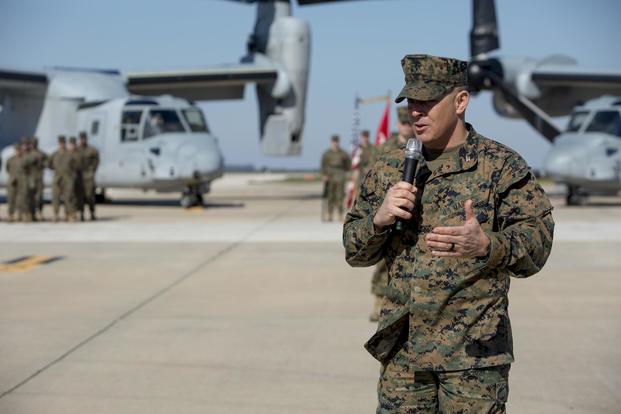The commander of a special Marine Corps task force said Friday that conditions on the ground are improving for the return a U.S. diplomatic mission to Libya, six years after a devastating attack on the American consulate in Benghazi left four Americans dead.
Col. Adam Chalkley, commander of Special Purpose Marine Air-Ground Task Force-Crisis Response Africa -- the unit created as a result of the Sept. 11, 2012 Benghazi attack that killed U.S. Ambassador Chris Stevens and three other Americans -- said he spent much of his time on a recent six-month deployment helping to ensure there would be no repeat of that tragedy.
"There were indications that ... recent improvements in the landscape and the operating environment of Libya were suggestive that a reintroduction a diplomatic mission was on the near horizon," Chalkley said during a presentation at the Virginia-based Potomac Institute for Policy Studies.
"State Department was putting a lot of effort into building that out and doing key leader engagements that would enable [this] from a national interest perspective, so that really dominated what we were doing,” he said.
Chalkley's top operational priority was "we couldn't have another Benghazi," he said. "We cannot have another event like that ... a flashpoint that is going to result in the loss of U.S. diplomatic blue chips or loss of life."
The crisis-response task force deployed in March and spent seven months operating out of Morón Air Base in Spain and Naval Air Station Sigonella in Italy.
"I had three KC-130s, six MV-22s and a reinforced infantry company," Chalkley said, describing his force of approximately 850 Marines and sailors.
The reinforced infantry company had five platoons, three of which were dedicated to an alert cycle set to deploy within six hours of notification.
The task force worked directly for U.S. Marine Forces Europe and Africa but spent a lot of time working at the State Department and Special Operations Command Forward - North and West Africa.
"In many ways, our tie with SOF and our tie with Department of State efforts to reintroduce a diplomatic mission into Libya really dominated the entirety of our time,” Chalkley said.
The unit's primary mission was to provide limited crisis and contingency response, conduct operations to safeguard U.S. citizens, facilities and interests in theater, he said.
Chalkley's unit also did several survey and assessment missions for U.S. Africa Command.
"Those were essentially phase-zero looks at various embassy sites, particularly the high-threat, high-risk posts to ensure we validated the ... emergency action plans," Chalkley said.
It's no secret, he added, that following the attack in Benghazi, the State Department and other entities across the national security enterprise "took a very hard look at each of those facilities, obviously validating emergency action plans and using new embassy compounds and other things to bolster regional security.”
"There is obviously a large desire to return to a U.S. diplomatic presence," Chalkley said, explaining that conditions looked favorable for a time and then declined. "But there is still engagement; there are still things happening on a diplomatic front and building diplomatic ties."
Since Benghazi, several initiatives have occurred across the joint force that have resulted in a change in the security landscape, Chalkley said.
"There are enough things in place across the enterprise to ensure that we have the appropriate response," Chalkley said.
"It's not just our team going in and being the sole responders. Special operations forces and other elements arrayed across the continent ... they are able to do the things they do because they know that we are there to backstop them.
"We are there to facilitate and ensure that they are able to do their very discreet, very important missions in a manner that, again, helps serve as a deterrent, helps uncover potential threats [and] puts pressure on those organizations that serve as threats."
It's because of these new efforts that Chalkley returned from deployment feeling comfortable that the U.S. is capable of handling a Benghazi-style attack on a future U.S. diplomatic mission.
"I am confident that we are not going to have another [threat] that would go unnoticed," he said. "Now that said, the reason those things aren't happening is because people know that we are there and ready to come in. There is an absolute recognition that operations and forces postured on the periphery, able to respond is a great deterrent for people behaving badly."
-- Matthew Cox can be reached at matthew.cox@military.com.














